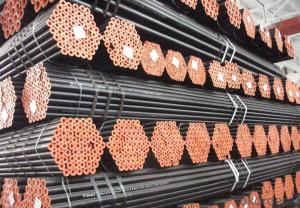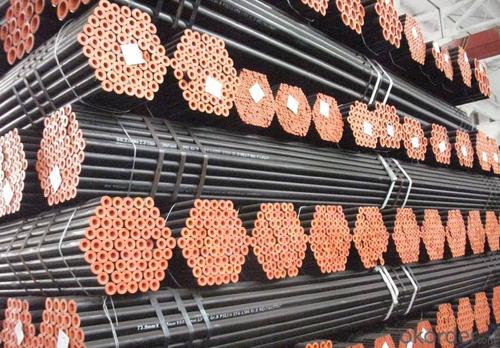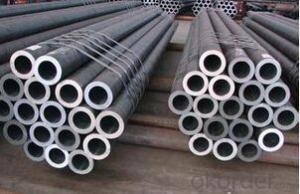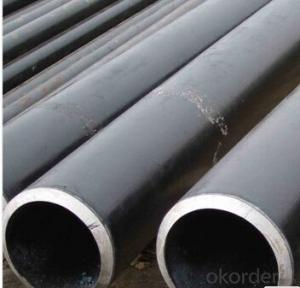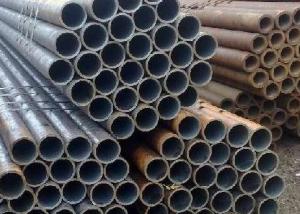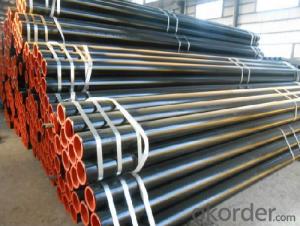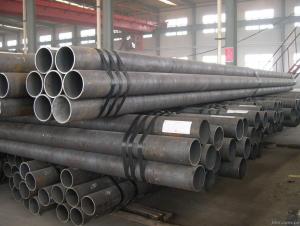Seamless steel tube for medium and low pressure boiler
- Loading Port:
- Tianjin
- Payment Terms:
- TT or LC
- Min Order Qty:
- 45 m.t.
- Supply Capability:
- 17000 m.t./month
OKorder Service Pledge
OKorder Financial Service
You Might Also Like
1、Structure of Seamless steel tube for medium and low pressure boiler:
Seamless pipe is formed by drawing a solid billet over a piercing rod to create the hollow shell. As the manufacturing process does not include any welding, seamless pipes are perceived to be stronger and more reliable. Historically seamless pipe was regarded as withstanding pressure better than other types,
2、Main Features of Seamless steel tube for medium and low pressure boiler:
• High manufacturing accuracy
• High strength
• Good visual effect
• Reasonable price
3、Seamless steel tube for medium and low pressure boiler Specification:
Standard | GB, DIN, ASTM ASTM A106-2006, ASTM A53-2007 |
Grade | 10#-45#, 16Mn 10#, 20#, 45#, 16Mn |
Thickness | 8 - 33 mm |
Section Shape | Round |
Outer Diameter | 133 - 219 mm |
Place of Origin | Shandong, China (Mainland) |
Secondary Or Not | Non-secondary |
Application | Hydraulic Pipe |
Technique | Cold Drawn |
Certification | API |
Surface Treatment | factory state or painted black |
Special Pipe | API Pipe |
Alloy Or Not | Non-alloy |
Length | 5-12M |
Outer Diameter | 21.3-610mm |
Grade | 20#, 45#, Q345, API J55, API K55, API L80, API N80, API P110, A53B |
Standard | ASME, ASTM |
1) Material:20#(ASTM A 106/A53 GRB.API5LGRB,GB),45#,16Mn,10#.
2) Specification range:OD:21.3-610mm,WT:6-70mm,length:6-12m or according to the requirement of clients.
3) Excutive standards:GB,ASME API5L.ASTM A 106/A53,Despite of the above standards,we can also supply seamless steel pipe with standard of DIN,JIS,and so on,and also develop new products according to the requirements of our clients!
4) Surface:black lacquered,varnish coating or galvanized.
5) Ends:Beveled or square cut,plastic capped,painted.
6) Packing:bundles wrapped with strong steel strip,seaworthy packing.
4、Packaging & Delivery
Packaging Details: | seaworthy package,bundles wrapped with strong steel strip |
Delivery Detail: | 15-30days after received 30%TT |
5、FAQ of Seamless steel tube for medium and low pressure boiler:
①How is the quality of your products?
Our products are manufactured strictly according to national and internaional standard, and we take a test
on every pipe before delivered out. If you want see our quality certifications and all kinds of testing report, please just ask us for it.
Guaranteed: If products’ quality don’t accord to discription as we give or the promise before you place order, we promise 100% refund.
②Why should you chose us?
Chose happens because of quality, then price, We can give you both.Additionally, we can also offer professional products inquiry, products knowledge train(for agents), smooth goods delivery, exellent customer solution proposals.Our service formula: good quality+good price+good service=customer’s trust
SGS test is available, customer inspection before shipping is welcome, third party inspection is no problem.
6、Seamless steel tube for medium and low pressure boiler Images:
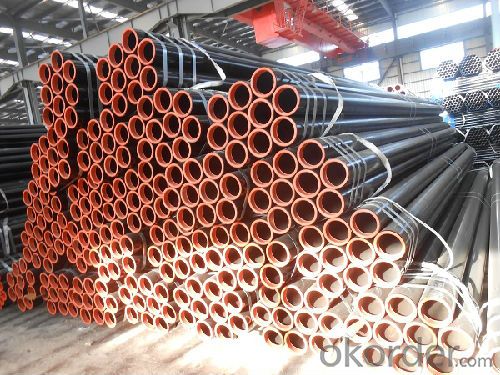
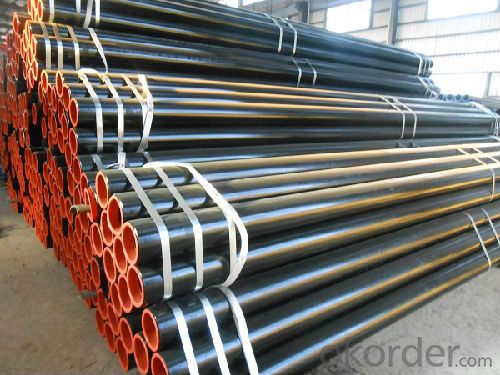
- Q: How do steel pipes handle high-pressure applications?
- Steel pipes are commonly used in high-pressure applications because of their inherent strength and durability. The high tensile strength of steel allows it to withstand the pressure exerted on the pipes without deforming or bursting. Moreover, steel pipes are resistant to corrosion, making them ideal for handling various types of fluids and gases under high-pressure conditions. Additionally, the seamless construction of steel pipes eliminates weak points and ensures their reliability and safety in high-pressure environments.
- Q: How are steel pipes used in wastewater treatment plants?
- Steel pipes are used in wastewater treatment plants for various purposes such as transporting wastewater, carrying chemicals and additives, and supporting the infrastructure.
- Q: How are steel pipes used in the mining and mineral processing industry?
- Steel pipes are used in the mining and mineral processing industry for various purposes such as transporting fluids, conveying materials, and providing structural support. They are commonly used in the construction of underground mine shafts, pipelines, and equipment for transporting and processing minerals. The durability and strength of steel pipes make them ideal for withstanding the harsh conditions and demanding requirements of the mining industry.
- Q: Can steel pipes be used for underground pressure pipelines?
- Yes, steel pipes can be used for underground pressure pipelines. Steel pipes are known for their strength and durability, making them suitable for various applications, including underground pressure pipelines. They can withstand high pressure and are resistant to corrosion, making them a reliable choice for transporting fluids or gases underground. Additionally, steel pipes are available in different sizes and thicknesses, allowing for customization based on the specific requirements of the pipeline project. However, it is important to ensure proper coating or lining of the steel pipes to prevent corrosion caused by soil conditions or the transported substance. Regular maintenance and inspections are also necessary to ensure the integrity and longevity of the underground pressure pipelines made of steel pipes.
- Q: Can steel pipes be used for drinking water supply?
- Yes, steel pipes can be used for drinking water supply. However, it is important to ensure that the pipes are properly coated or lined to prevent corrosion and any potential contamination of the water. Regular maintenance and monitoring are also necessary to ensure the pipes remain in good condition for safe drinking water supply.
- Q: Are steel pipes suitable for wastewater pumping stations?
- Indeed, steel pipes prove to be a fitting option for wastewater pumping stations. Renowned for their endurance and robustness, steel pipes excel in handling the challenging conditions and high-pressure demands within these stations. They possess the capacity to withstand the corrosive properties of wastewater while resisting harm caused by chemicals and other aggressive substances commonly present in such environments. Furthermore, steel pipes are accessible in a variety of sizes and thicknesses, enabling customization to fulfill the specific requirements of each pumping station. Moreover, the ability to easily weld and connect steel pipes ensures a secure and leak-proof system. In conclusion, steel pipes provide a dependable and enduring solution for wastewater pumping stations.
- Q: Can steel pipes be bent or shaped?
- Yes, steel pipes can be bent or shaped through various methods such as hot bending, cold bending, or using specialized machinery like pipe benders.
- Q: Can steel pipes be used in the automotive industry?
- Yes, steel pipes are commonly used in the automotive industry for various applications such as exhaust systems, fuel lines, and structural components. The high strength, durability, and heat resistance of steel make it an ideal material for handling the demands of the automotive environment.
- Q: Are steel pipes suitable for underground nuclear waste storage?
- Steel pipes are not suitable for underground nuclear waste storage. While steel is a strong and durable material, it is not resistant to corrosion when exposed to certain types of nuclear waste. Over time, the radioactive materials can corrode the steel pipes, leading to potential leaks and contaminating the surrounding environment. Additionally, steel pipes are not designed to withstand the extreme temperatures and pressures that can occur in nuclear waste storage facilities. Therefore, alternative materials such as corrosion-resistant alloys or concrete are typically used for underground nuclear waste storage to ensure the containment and isolation of the hazardous materials.
- Q: What are the different types of steel pipe supports for seismic applications?
- There are several types of steel pipe supports commonly used for seismic applications, including sway braces, rigid braces, snubbers, and restraints. Sway braces are designed to absorb lateral movement and provide flexibility during seismic events. Rigid braces, on the other hand, offer rigid support and resist movement. Snubbers are used to dampen pipe vibrations and prevent excessive movement. Restraints are used to anchor and limit the movement of the pipe during seismic activity.
Send your message to us
Seamless steel tube for medium and low pressure boiler
- Loading Port:
- Tianjin
- Payment Terms:
- TT or LC
- Min Order Qty:
- 45 m.t.
- Supply Capability:
- 17000 m.t./month
OKorder Service Pledge
OKorder Financial Service
Similar products
Hot products
Hot Searches
Related keywords
